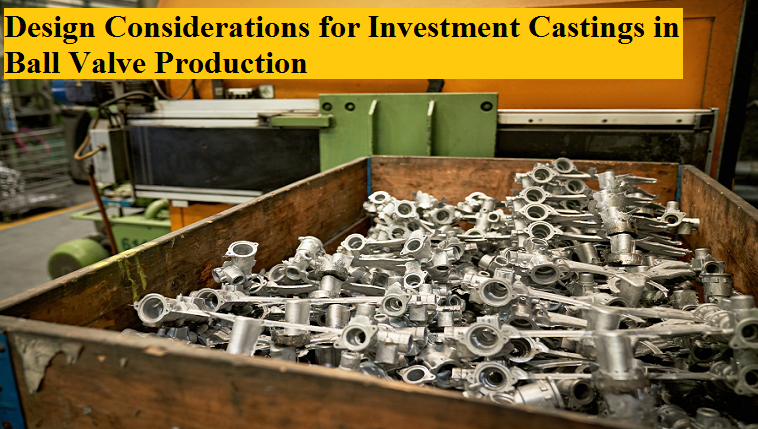When it comes to the production of investment castings for ball valves, accuracy is of the utmost importance. In order to guarantee that these castings continue to perform in an appropriate and effective manner, a high degree of precision is required. Every single step, beginning with the design process and ending with the final product, has to be meticulously carried out in order to guarantee that the valve that is produced is of the highest possible quality.
The use of design concepts is what comes into play here. Manufacturers are able to improve the casting process, reduce errors, and create high-quality ball valves that work repeatedly and predictably if they make use of the appropriate design ideas.
Here we will discover some of the most effective design strategies that investment castings for ball valves manufacturers can use to best the precision of their ball valves.
Design Criteria for Investment Castings in Ball Valve Production
- When it comes to investment castings for ball valves, accuracy is of the utmost importance. To achieve the highest possible level of accuracy in these components, design considerations are of the utmost importance. During the design process, there are a number of considerations that need to be taken into account in order to attain the greatest possible degree of accuracy.
- In the first place, it is absolutely necessary to have a solid grasp of the functioning needs of the ball valve. This involves taking into consideration a variety of elements, including the pressure rating, flow control, temperature range, and chemical compatibility. Through the process of explicitly specifying these criteria, designers are able to modify the design of the casting to fulfil the particular requirements of the application.
- With regard to the accuracy of ball valve investment castings, geometry is another factor that plays a key part in the determination process. Wall thickness, radii, and fillets are some of the features that need to be properly constructed in order to guarantee uniformity and consistency throughout the casting. The designers are able to reduce the number of faults and enhance the overall accuracy of the casting by improving the geometry of the casting.
- In addition, the selection of materials is still another essential component of designing for precision requirements. When it comes to maintaining the durability and performance of the ball valve, it is crucial to choose the ideal material that has the required mechanical qualities. During the process of choosing the material for the casting, it is important to take into consideration a number of factors, including resistance to corrosion and wear, as well as temperature stability.
- Particular attention should be paid to the design of the internal tubes, channels, and cavities that are included inside the components of the ball valve. Make sure that these characteristics are constructed in such a way that they assist the flow of fluid, the management of pressure, and the process of valve functioning.
- In order to maximize the efficiency of the tooling and molding process for the production of the ball valve components, you should collaborate closely with the investment casting foundry. The location of gates and risers, the design of the die, and the general arrangement of the mold are all important considerations when trying to produce high-quality castings.
- In order to monitor and guarantee the dimensional correctness, surface finish, and mechanical qualities of the investment cast components, it is necessary to use quality control methods throughout the whole manufacturing process. In order to maintain quality standards that are constant, it is necessary to inspect the castings for any faults or inconsistencies.
In addition, it is vital to develop precise quality control methods and documentation processes in order to guarantee consistency and traceability throughout the production process. Manufacturers are able to see patterns, put corrective steps into place, and constantly improve their casting processes if they record all inspection data and keep track of any deviations.
In precision casting, producers are able to guarantee that the ball valves fulfil the needed performance criteria, offer long-term durability, and give optimum functionality in a variety of applications in industry by giving careful consideration to the selection of the material.

Leave a comment